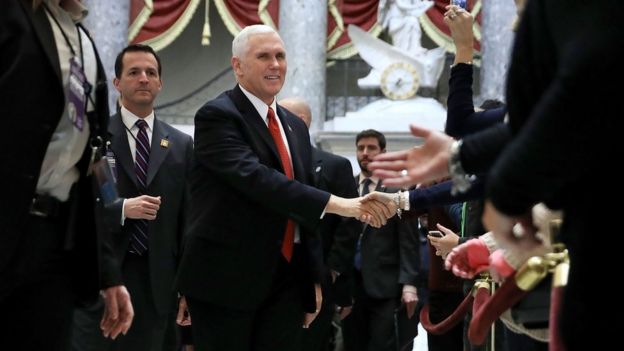Senate passes sweeping US tax reform
The US Senate has approved the most sweeping overhaul of the US tax system in more than three decades.
Republicans say the tax cuts for corporations, small businesses and individuals will boost economic growth.
Democrats, who all voted against it, say it is designed to benefit the ultra-rich at the expense of the national deficit.
For final approval, the legislation must go back to the House on Wednesday for a procedural issue.
If it passes, as expected, it will be President Donald Trump's first major legislative triumph.
The United States Senate just passed the biggest in history Tax Cut and Reform Bill. Terrible Individual Mandate (ObamaCare)Repealed. Goes to the House tomorrow morning for final vote. If approved, there will be a News Conference at The White House at approximately 1:00 P.M.
Vice-President Mike Pence presided over the vote and announced the result.
"On this vote the ayes are 51, the nays are 48. The Tax Cuts and Jobs Act is passed," he said.
Shortly before the final tally was announced, protesters in the Senate's public gallery shouted "kill the bill". They were escorted out.
What will the bill do?
Corporate taxes will pay 21%, instead of the current rate of 35%.
It will also lower individual tax rates, albeit temporarily.
Other key elements include:
- Less inheritance tax
- An expanded child tax credit
- Lower taxes on overseas profits
Why is a re-vote needed?
The bill's final passing hit a last-minute glitch when it was found that three procedural rules had been violated. As small changes to the wording were made, it now needs to return to the House of Representatives to be approved again.The House earlier approved the bill comfortably. Republicans have majorities in both houses of Congress.Who are the winners and losers?
It is good news for businesses, particularly multinational corporations and the commercial property industry.The extremely wealthy and parents sending their children to private schools are set to benefit.However, families living in high-tax, high-cost states could lose out, so could those paying for their own health insurance.- In the immediate future, the plan will see the vast majority of tax payers having lower tax bills, but the cuts expire in 2025.By 2027, the Tax Policy Center estimates that the overall change would be negligible. And 53% of taxpayers would face higher bills, many of them in the lower income brackets.
Why are Arctic animals also losing?
Republicans attached a measure to the tax bill that opens drilling in parts of the Arctic that have been protected for environmental reasons since 1960. - It wasn't easy, but in one fell legislative swoop, Republicans have achieved some long-sought political goals.Subject to a vote in the House early on Wednesday, they have reduced taxes by more than $1.4 trillion (£1tn) over 10 years, including significant changes to the corporate tax structure.Congressional conservatives also opened the Arctic National Wildlife Refuge to oil drilling - a pitched partisan battle for years. And it set a bomb at the heart of Obamacare by ending the tax penalty for those who don't have medical insurance starting in 2019.
 Vice-President Mike Pence announced the result
Vice-President Mike Pence announced the result- Source:http://www.bbc.com/news/world-us-canada-42421821


No comments:
Post a Comment